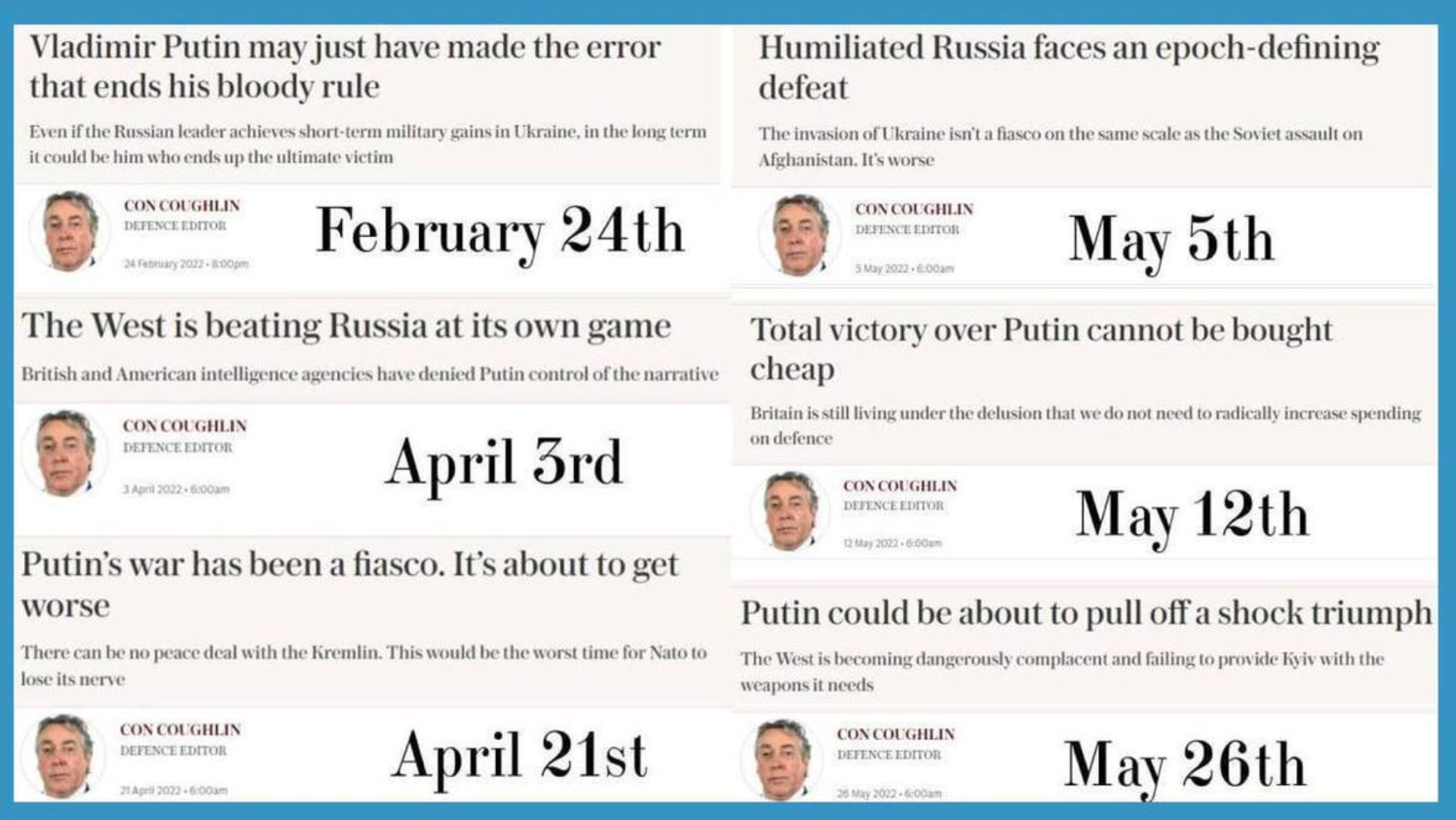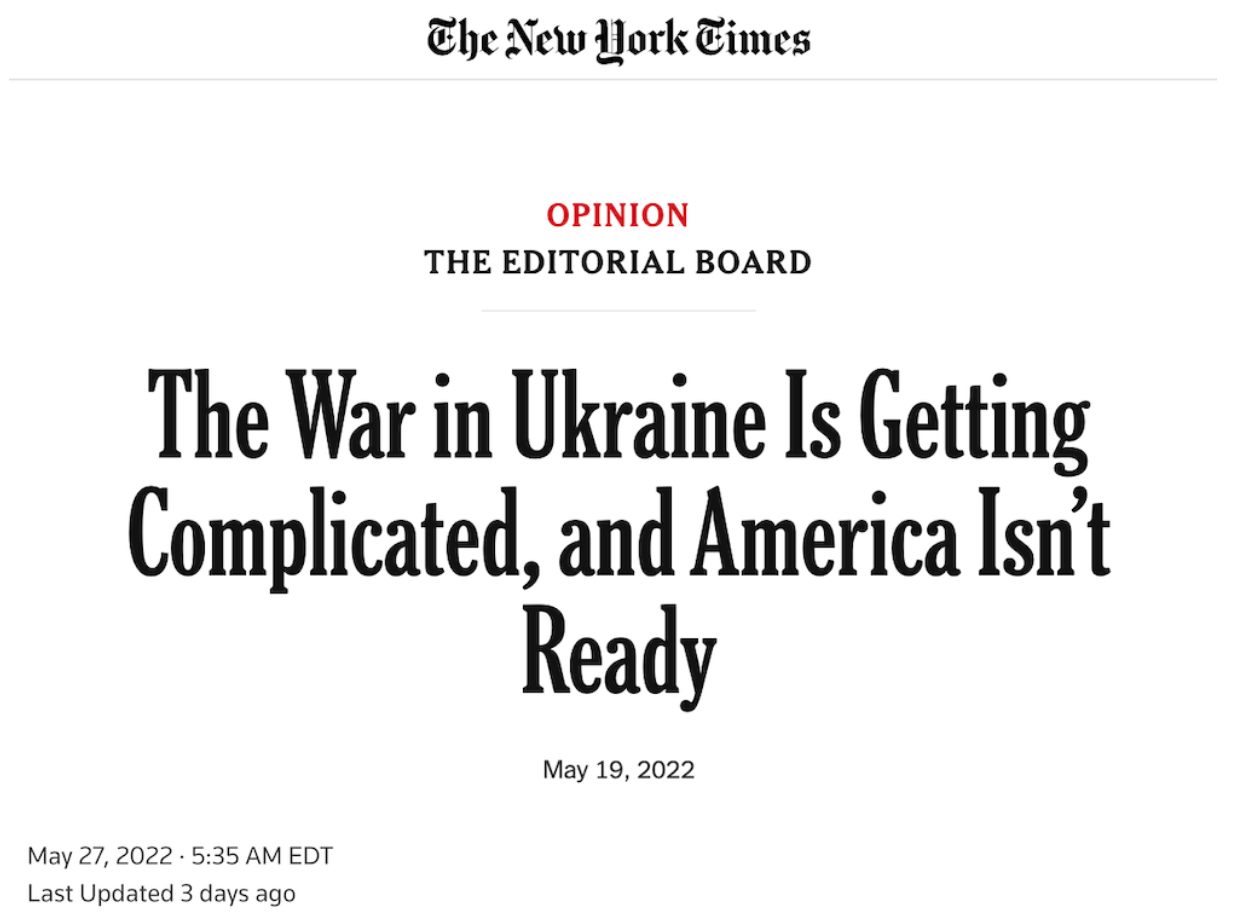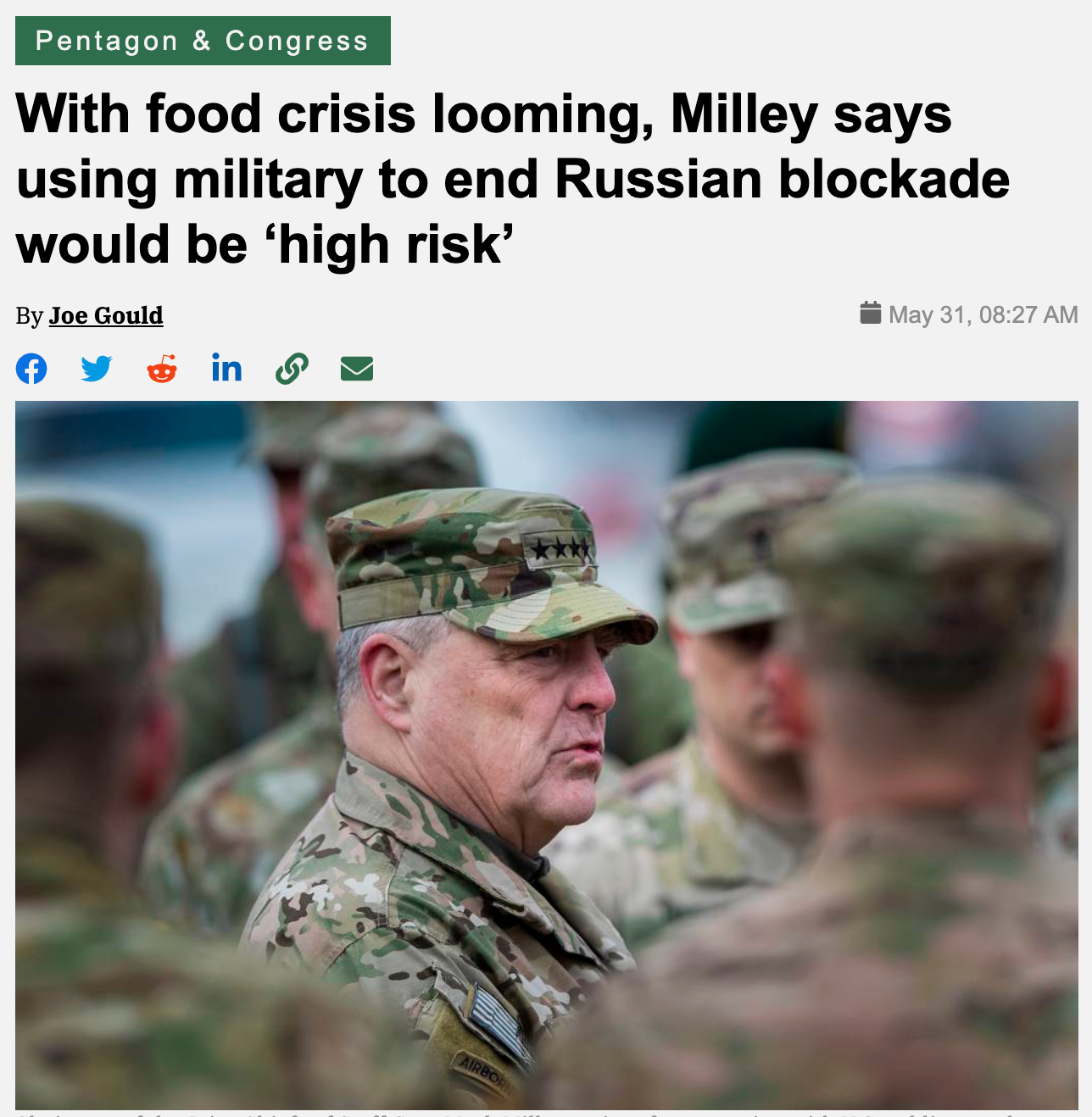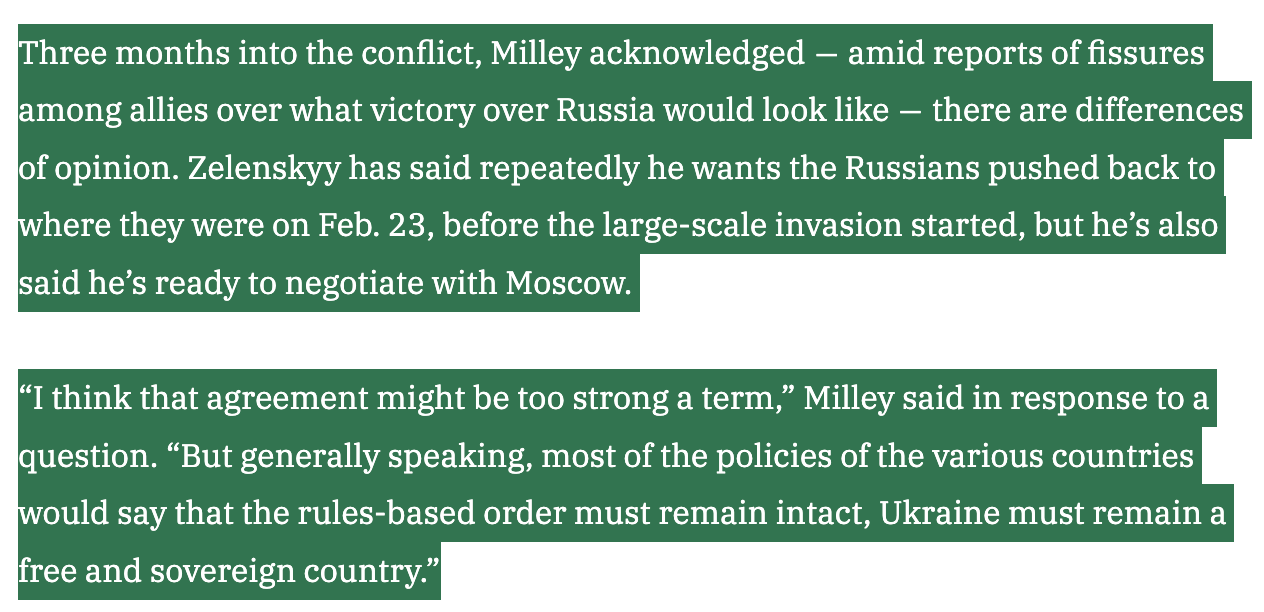
I recently pointed out some of the instances of the mainstream media calling for a US surrender in the Ukraine, or at least suggesting that a victory is not possible.
An op-ed in RT today points out more examples of this.
Serbian journalist Nebojsa Malic writes:
Even as the collective West continues to insist – against all observable reality – that the conflict in Ukraine is going well for Kiev, major media outlets are becoming increasingly uneasy with the situation on the economic front. More and more observers are admitting that the embargoes imposed by the US and its allies aren’t crushing the Russian economy, as originally intended, but rather their own.
Meanwhile, major publications have begun to report on the actual situation on the frontlines, rather than uncritically quoting myths like the ‘Ghost of Kiev’ or ‘Snake Island 13’ propagated by Volodymyr Zelensky’s office, as they did early on. There have even been hints, however timid, that the West should perhaps stop unconditionally supporting Kiev and promote a negotiated peace instead.
“Russia is winning the economic war,” the Guardian’s economics editor Larry Elliott declared on Thursday. “It is now three months since the west launched its economic war against Russia, and it is not going according to plan. On the contrary, things are going very badly indeed,” he wrote.
Elliott actually argues that the recent US announcement of sending rocket launchers to Ukraine is proof that sanctions are not working: “The hope is that modern military technology from the US will achieve what energy bans and the seizure of Russian assets have so far failed to do: force [Russian President Vladimir] Putin to withdraw his troops.”
In a May 30 essay, Guardian columnist Simon Jenkins also said that the embargo had failed to force a Russian withdrawal, but argued the EU should “stick to helping Ukraine’s war effort” instead, while withdrawing the sanctions because they are “self-defeating and senselessly cruel.”
As Jenkins points out, the sanctions have actually raised the price of Russian exports such as oil and grain – thus enriching, rather than impoverishing, Moscow while leaving Europeans short of gas and Africans running out of food.
Note that Jenkins is wrong about the supposed effectiveness of Western weapons, given that Russian and Donbass troops have won a series of victories over the past month – from Popasnaya to Liman. On May 26, the Washington Post of all places published a shockingly frank account of how one Ukrainian unit lost more than half its strength near Severodonetsk and retreated to the rear. Its commanders actually got arrested for treason after speaking to the US outlet.
This reality couldn’t be ignored by even the Telegraph’s defense editor, Con Coughlin, who’s become somewhat of a meme for prophesying Russian defeat on a weekly basis. He is now saying Moscow might pull off a “shock triumph” – albeit in service of his argument that Kiev needs even more weapons.
The collective West’s failure to break Russia was apparent even to The Economist, not exactly a publication sympathetic to Moscow. The newspaper reluctantly admitted a month ago that the Russian economy had bounced back from the initial sanctions shock. Meanwhile, it’s the West that has to deal with energy shortages, spiraling costs of living, and record inflation. It’s Americans, not Russians, who can’t find baby formula in stores and can’t afford gas.
Perhaps that’s why this “spring of discontent” with the Western sanctions policy hasn’t been confined to the European side of the Atlantic. On Tuesday, the New York Times ran an op-ed by Christopher Caldwell in which he criticized the Biden administration for “closing off avenues of negotiation and working to intensify the war” by sending more and more weapons to Kiev.
“The United States is trying to maintain the fiction that arming one’s allies is not the same thing as participating in combat,” Caldwell wrote, pointing out that this distinction is getting “more and more artificial” in the information age. A day later, the head of the US Cyber Command admitted to conducting offensive operations against Russia on Ukraine’s behalf.
The US has “given Ukrainians cause to believe they can prevail in a war of escalation,” Caldwell wrote, which is why Kiev isn’t eager to make peace. Indeed, when none other than Henry Kissinger tried to argue in Davos for settling the conflict quickly, Zelensky’s office cursed him out. He was soon designated an enemy of the Ukrainian state.
There have been calls for an off-ramp to the war even earlier – though few and far between, and lost amid the ongoing cacophony of media cheerleading for Kiev. Back on May 18, the usually hawkish Charles Kupchan of the Council of Foreign Relations advised Ukraine in the pages of The Atlantic to “take the W,” so to speak.
“Russia has already been dealt a decisive strategic defeat,” he wrote. “For NATO and Ukraine alike, strategic prudence argues in favor of pocketing these successes rather than pressing the fight and running the tantamount risks.” NATO, Kupchan added, should advise the Ukrainian government on how to end the bloodshed, and soon.
The very next day, the New York Times’ editorial board echoed his argument, saying a decisive Ukrainian victory over Russia was “not a realistic goal” and that US President Joe Biden should tell Zelensky that there is a limit to which the US will go.
“It is imperative that the Ukrainian government’s decisions be based on a realistic assessment of its means and how much more destruction Ukraine can sustain,” they wrote.
It’s all intensely strange. It’s difficult to grasp what is happening. The New York Times Editorial Board piece was especially confusing.
The Times is quite literally the paper of the American intelligence services. They print the narrative. Of course, if you are one of the few that reads the op-ed pages, you know that they print differing views – it’s a place for Jews to argue with each other about the best way to stick it to the goyim. But an Editorial Board piece is something very specific, as it generally means “this is the official policy of the intelligence establishment.”
After reading it in the Times, and then seeing these other media outlets saying the same thing, it made sense to me when Biden seemed to be drawing a line at the HIMARS. I thought we were finally going to start seeing the government pivot falling in line with the emerging media pivot.
Instead, the very next day, “Biden” wrote an op-ed for the New York Times, declaring eternal support for the Ukraine, and vowing to send the missile systems.
I just want to be clear: I have no idea what is going on here. I’m pretty good at coming up with one or more explanations for things, even when we don’t have the details, but in this case, I cannot think of a single possible explanation.
We could come up with various theories about why the Administration is refusing to back down in light of an obvious total defeat. But none of those theories jives with the fact that the media is telling people the war is lost.
Hopefully at this point, everyone understands that the American media is state media – as much as media is state media under communism, American media is state media. The Daily Stormer is Samizdat, which is why most of the time we have the exact opposite position as the mainstream state media.
So it’s a very rare thing to see the media breaking with the Democrat Party on anything at all, and particularly on a war.
The only thing I can draw from this, in terms of a theory about what is going on, is that the intelligence services are calling for a surrender while someone in the Biden Administration is pushing him to keep going. It has to be some kind of disagreement, unless it is some kind of psychological operation that I can’t figure out the purpose of.
You’ve even now got Mark Milley coming out and saying it’s time to negotiate.
So who is saying “no, no – keep going”?
I have no idea. We don’t know because we don’t know who is running the Biden Administration. So it’s impossible to point to where the power lies. Typically, we understand the agenda by looking at the media, but that doesn’t work here and I don’t know why.
The whole thing is certainly compounded by the fact that there is no possible way for the Ukraine to do anything but lose harder in the coming weeks and months. On Wednesday, they fled a major strategic town and Russia took it. In the future, we are just going to keep seeing loss after loss.
Of course in theory, you could say that the US just wants to maximize destruction. That is just going to maximize their own humiliation when they finally are forced to admit defeat, but it’s at least plausible.
But still – why is the media jumping off?
I suppose it’s possible that it is just the media trying to preserve their own credibility. That’s usually not how this game is played – see the 2016 election, when the media knew Trump was going to win and just kept lying – but maybe in this case, the media is being allowed to save their credibility, because no one really seems to care about saving Joe Biden anyway, who just keeps getting thrown under the bus, being blamed for the fallout of the lunatic Democrat agenda that he’s played zero role in developing.




